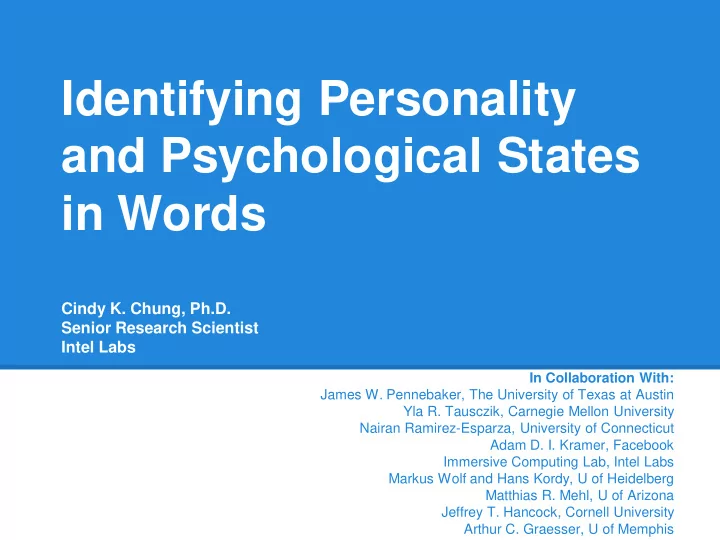

Identifying Personality and Psychological States in Words Cindy K. Chung, Ph.D. Senior Research Scientist Intel Labs In Collaboration With: James W. Pennebaker, The University of Texas at Austin Yla R. Tausczik, Carnegie Mellon University Nairan Ramirez-Esparza, University of Connecticut Adam D. I. Kramer, Facebook Immersive Computing Lab, Intel Labs Markus Wolf and Hans Kordy, U of Heidelberg Matthias R. Mehl, U of Arizona Jeffrey T. Hancock, Cornell University Arthur C. Graesser, U of Memphis
Two Research Tracks How do the words we use in our everyday lives reflect our personalities, relationships, and wellbeing? 1. Function words & social relationships 2. Content words & dimensions of communication Chung & Pennebaker McCarthy & Boonthum (Eds.), Applied Natural Language Processing, 2012
Function Words and Social Relationships Chung & Pennebaker Fiedler (Ed.), Social Communication, 2007 Hancock, Beaver, Chung, Frazee, Pennebaker, Cai, & Graesser Behavioral Sciences in Terrorism and Political Aggression, 2010 Pennebaker & Chung Krippendorf & Bock (Eds.) , “A Content Analysis Reader”, 2008
Function Words and Social Relationships Tausczik, Chung, & Pennebaker Under review
Content Words and Dimensions of Communication The (Galton) Lexical Hypothesis of Personality 1. Personality traits that are important to people’s lives will be represented in language. 2. The most important traits will be encoded as a single word in language. Chung & Pennebaker Journal of Research in Personality, 2008
Content Words and Dimensions of Communication The Big Five Openness Conscientiousness Extraversion Agreeableness Neuroticism
Content Words and Dimensions of Communication NEGATIVITY SOCIABILITY MATURITY Mad Quiet Mature Bad Shy Successful Hurt Caring Outgoing Horrible Reserved Capable Scared Comfortable Accomplished +N -E +E Chung & Pennebaker Journal of Research in Personality, 2008
Content Words and Dimensions of Communication SOCIABILITY HOBBIES SIMPATIA Hablar Musica Carinosa Music Speak Affectionate Prefiero Cine Rencororsa Prefer Movies Rancorous Miedo Bailar Honesta Fear Dance Honest Expresar Leer Celosa Express Read Jealous Confianza Escuchar Sensible Trust Listen Sensible Ramirez-Esparza, Chung, Sierra-Otero, & Pennebaker Journal of Cross-Cultural Psychology, 2012
Content Words and Dimensions of Communication INFORMAL POSITIVE SCHOOL SPEECH EVENTS fucked day homework shitty time study bitch good essay ass love English haha likes exam Kramer & Chung Proceedings of the International Conference on Weblogs and Social Media, 2011
Content Words and Dimensions of Communication SYMPTOM HOME TREATMENT WORK Pain Husband Therapist Company Sad Daughter Therapy Colleague Body Son Physicians Boss Wolf, Chung, & Kordy Psychotherapy Research, 2010a; 2010b
Thanks to Matthias R. Mehl, U of Arizona Jamie Pennebaker, UT Nairan Ramirez-Esparza, Uconn The Pennebaker Lab Yla Tausczik, CMU Art Graesser, U of Memphis Adam D. I. Kramer, Facebook Jeff Hancock, Cornell U David I. Beaver, UT Markus Wolf, U of Heidelberg Hans Kordy, U of Heidelberg Immersive Computing Lab, Intel Labs
For More Information Cindy.K.Chung@Intel.Com
Recommend
More recommend